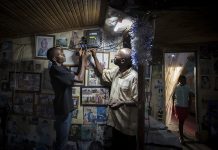
In a first of its kind in the Middle East, the UAE is set to host a nuclear power plant in the region. The 5,600MW Barakah nuclear power plant (NPP), located around 53km from the city of Ruwais, is a joint venture between Korea Electric Power Corporation (KEPCO) and Emirates Nuclear Energy Corporation (ENEC). And it just has been cleared for start-up.
The ground-breaking ceremony for the $32 billion project was conducted in March 2011. The nuclear plant will consist of four units of 1,400MW each. The construction of unit 1 was started in July 2012 following the receipt of a construction licence from the Federal Authority of Nuclear Regulation (FANR), and was completed in May 2018.
The Barakah nuclear power plant, which is expected to serve up to a quarter of the country’s electricity requirements when it is fully commissioned, is expected to be operational later this year. It will offset approximately 21 million tonnes of greenhouse gas emissions a year.
Construction of the nuclear power plant
The construction of Unit 1 of the nuclear power plant started in July 2012 with the laying of the first nuclear safety concrete. Construction of the reactor containment building (RCB) also began in this month while the RCB concrete dome was completed in January 2015. July 2012 also saw the fabrication of the basement. In February 2014, ENEC installed the condenser and in May 2014, the first reactor vessel (RV) was created.
Construction of unit 2 commenced in May 2013, while that of unit 3 started in September 2014. In 2015, concrete pouring was done for Unit 4. The main concrete works and heavy lifting for units 2, 3 and 4 were completed by November 2018.
The Abu Dhabi government has funded the $16.2 billion Barakah nuclear power plant while the Export-Import Bank of Korea (KEXIM) is providing a loan of $2.5 billion.
Korean nuclear technology
The Barakah nuclear power plant will be home to APR1400 nuclear reactor technology which was developed by South Korea’s nuclear giant Kepco. The reactor’s design is based on the System 80+, which is certified by the U.S.-based Nuclear Regulatory Commission (NRC). It is also licensed by the Korean nuclear safety regulator, the Korea Institute of Nuclear Safety (KINS), and is slated to have a lifespan of at least 60 years.
The APR in the APR1400 stands for Advanced Power Reactor while the 1400 represents its capacity. APR-1400, an upgraded version of South Korea’s OPR1000, the Optimum Power Reactor 1000MW, is an advanced pressurised water nuclear reactor that has been designed by the Korea Electric Power company.
The Generation-III+ reactor includes advanced features including passive flow regulation device in the safety injection tank, direct vessel injection from the safety injection system, systems for severe accident mitigation, management systems and in-containment refuelling water supply system.
The APR1400 reactor sports two steam generators, which transfers 4,000MW of heat from the reactor coolant system to the secondary system, which them produces steam to drive the turbine-generator, which in turn produce a net electrical power of 1,400MW.
The APR1400’s reactors to the UAE have been customised to climatic conditions prevalent in the region. The reactors also feature larger pumps, improved ventilation design, plant cooling and seawater intake systems, as well as a more refined intake screen design. It has been designed such that it can withstand earthquakes of 7.0 magnitude or higher on the Richter scale. A strange choice knowing that the UAE are located on the edge of the Arabian Tectonic Plate.
Major contractors
Following a bidding process, ENEC awarded the $20.4 billion contract to a consortium led by Korea Electric Power Corporation (Kepco); The contract includes designing, constructing and operating of the four APR1400 nuclear power units at the Barakah NPP.
- The consortium includes Korea Power Engineering Company (KOPEC), Korea Hydro and Nuclear Power (KHNP), Korea Nuclear Fuel (KNF), Korea Plant Service and Engineering (KPS), Samsung, Hyundai, and Doosan.
- While KHNP is in charge of operating support services as well as cooperative businesses, KEPCO Engineering and Construction (KEPCO E&C) was awarded the subcontract for providing plant design, architecture and engineering works.
- Doosan was entrusted with the construction and management of the nuclear steam supply system (NSSS), steam generator, and other related components.
- Samsung and Hyundai are responsible for the civil engineering works
- Westinghouse is responsible for technical assistance and licence-related works.
- KNF will supply nuclear fuel, which will be maintained by KPS.
- A local company by the name of Hilal Bil Badi and Partners Contracting (HILALCO), was contracted for developing the water intake structures for the project as well as the reinforced concrete structures which will provide cooling water for the turbine condensers and heat exchangers in the turbine generator building.
- Design and project management support services is being provided by KEPCO E&C, a subsidiary of KEPCO.
- In November 2018, Nawah Energy Company signed a long-term operation and maintenance (O&M) agreement with EDF for the Barakah nuclear power plant.
- In June 2019, Korea Hydro & Nuclear Power (KHNP) and KEPCO Plant Service & Engineering were awarded long-term maintenance contracts for the Barakah nuclear energy plant.
- Nawah also signed a maintenance service agreement with DHIC, a subsidiary of Doosan, in June 2019.
Uranium supply
ENEC has also signed supply contracts with Techsnabexport (Tenex) and Areva for the supply of uranium concentrates along with providing conversion and enrichment services. Uranium One and Rio Tinto were contracted for the supply of natural uranium for the plant.
While Converdyn will provide conversion services, Urenco will provide enrichment services.
Once the uranium has been enriched, it will be supplied to Kepco Nuclear Fuels for manufacturing the fuel assemblies for use at the nuclear power plant.










